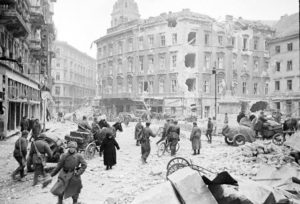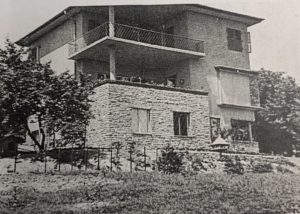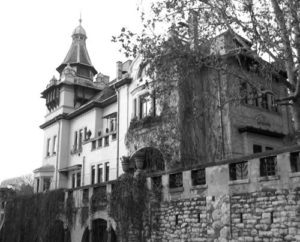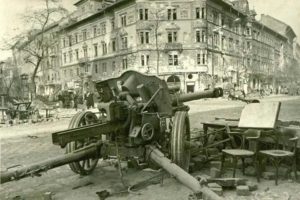
Since the beginning of the Russian army’s incursion into Ukraine in February 2022, many eastern European Jews and Holocaust survivors including George Soros have likened the conflict to the 1944 Siege of Budapest. With the growing threat of a Russia-NATO direct conflict and the likelihood of escalation to a wider, global war, one could argue that the past itself is making incursions into the present.

The following is an excerpt from the wartime memoirs written by Ferenc Szoges, father of OVED co-founder and Vice-President Celine Szoges. In his own words, Ferenc details his experiences under Hungary’s fascist regime and the historic events that shaped both the course of his life, and the history of Hungary itself.
By witnessing The Siege of Budapest through Ferenc’s eyes, we not only catch a glimpse of what has been described as one of the worst battles of World War II, but also gain insight into how the human spirit can survive and triumph against all odds.
THE SIEGE OF BUDAPEST (Winter 1944/45) – by Ferenc Szoges
The chapter which follows is chaotic and fragmented, as were the events it covers. The Siege of Budapest certainly was the most woeful, tragic drama in my life – not only because of the extraordinary massing prevents at this time, but also because of their radical nature and far-reaching ramifications. Intermixed with this chapter are topics that are diverse – the only connecting thread being the time frame. Fundamental issues are embedded in the topics and I became aware of these only because of the gruesome circumstances we lived through. The Siege of Budapest was the abyss of my life, which left me with no choice other than to conquer or perish.
ONLY TO SURVIVE – THE UNDERGROUND
After the Nyilas (Hungary’s far-right nationalist party) takeover, political life in the country broke down, and the situation in the streets became increasingly anarchic. We knew then for certain that our ‘liberation’ would come from the Red Army, an outlook which left most people confused, frightened and irrationally disoriented. Some decided to flee to the West as a presumed safe haven, while some tried to rationalize the plan of transiting from Nazism to communism. Most however, buried their heads in the sand and did not want to think about what to expect. For all of us, the imperative became day-to-day survival.
We felt betrayed and sold out by the West, particularly by American President F.D. Roosevelt who showed flagrant ignorance of historic forces shaping central and eastern Europe. Our sense of betrayal was amply borne out by the events that followed the Russian occupation and subsequent division of Europe by the cold war. The most pressing question for the moment, however, was whether Budapest would, or would not, become a battleground. We had to prepare for the worst.

As I already indicated, the family abandoned the idea of fleeing to the West. Still, Apu kept the company truck ready, just in case of a last-minute change of heart. On the truck was mounted an odd-looking wooden booth, supposedly to serve as shelter and home. A better idea, however, was to build a bomb shelter, which is what we did. We excavated a hole down to basement level on the upper side of the lot against the exterior house wall. The hole was then covered with a one-meter-thick concrete slab topped with earth fill, and turned into a cave. The entrance to the cave was from the basement of the house through a gas-prop metal door. This shelter proved invaluable during the coming battle period…..
Apu explained that he had already contacted our shrewd lawyer friend Micu for advice. Many people were looking for asylum and were organizing schemes to survive the arbitrary natures of the times. We needed a defence against tyranny, not only from the Nazis but also from their by-now certain successors, the reds. We knew evil was to follow evil. There was no escape from evil. As a witness to human ingenuity a whole array of covert schemes were conceived, more or less dubious to help people. We decided to do whatever was possible to join groups which could provide critical information and bogus identifications documents.
Our friends Szabo Micu and Gabor were joining a mysterious group called ‘Alakulat’, something like a commando group. For the modest sum of three Napoleon gold coins the alakulat issued its members with an official looking order de route and laissez passer with instructions to facilitate our covert mission and ensure our safe passage. The paper was authenticated with official stamps and signatures. This was like a dangerous double-edged weapon, but Apu bought them nevertheless, one for Ocsi and one for me. Micu and Gabor had theirs also.
In addition to the alakulat certificate, Micu got us identification certificates that we were employees of the Angol-Magyar Bank in the hope that this could be useful. The International Red Cross had at the time a large office in Budapest, vastly overstaffed with jobs specially created for socialites seeking some refuge and anchor point. The Swiss chief of mission liberally cooperated with the citizenry, and through my social contacts I also obtained an International Red Cross member certificate. Lastly, before leaving for Switzerland, Bella passed on to me her embassy protection certificate given to Swiss citizens which could be posted at our door. Equipped with all such prestigious papers and multiple identities, the family felt somewhat better prepared to face the unknown.
One day a message came from the ‘alakulat’ asking us to appear at a fur store located in the Vaci Utca in Budapest’s chic quarter. The store belonged to a Jew. When we arrived we noticed that Gabi and Micu were already there, and I noticed several Jewish members in the group. We were told to validate our documents. The documents had to be signed by the Nazi commander of the city. To this end we were to report to the commander in person at the city hall. This seemed a chilling prospect. I discreetly checked with Gabi and Micu who agreed we had no option but to go. In the back room of the store we received a quick lesson on how to salute the commander, with arm outstretched Nazi-style, and what to say to him.
The commander’s office was installed underground in the basement of the city hall, which was now an air raid shelter. The basement had been converted into an underground village for the Nyilas elite who took residence there. The command occupied the furthermost cubicle in the complex, and we had to go through several checkpoints before reaching his office. On our way we passed through a maze of improved offices, living quarters and a kitchen with steaming cauldrons producing bean and onion stew. The atmosphere was that of simple-minded zealots, suspended in time.
We were led one by one into the commander’s office. The place was shadowy, dimly lit with candles. When it was my turn, I stepped forward, saluted, recited the text and presented my papers. The commander seemed insecure. Without a word or raising his eyes, he signed my papers. I quickly saluted again, retracted my steps through the maze of the underground ‘village’ and emerged into the daylight. I was relieved, but perplexed.
MY BROTHER’S CHANCE
The front moved into Hungary from the Carpathian Mountains and the Russians reached the plains. Anyu was very nervous and hurried to mobilize legal assistance and to call on influential connections…. Very conceivably she saved him from facing the firing squad (for deserting his military unit).
Anticlimax
Apu visited Baja (my father’s birth city and where my family came from) for a short time and came home with unusual news. In the street he had come across a Jewish acquaintance, a shoe-merchant named Fischer, who wore a Nyilas armband. Fischer turned away and discretely signaled Apu not to recognize him. After a moment Apu realized that Fischer was playing a dangerous game, that of hiding in the enemy’s clothes.
The Baja police had orders at that time to round up Jews, and to intern them. The father of Apu’s secretary, Mr. Balint was a policeman and we learned later from his daughter that he had committed suicide. He could not bear the burden of executing such orders and was left with little option but suicide as a way out in protest.
As I mentioned before, Picur (my grandmother’s friend)’s in-laws, the old Somogyi couple lived a withdrawn and dignified life in the stately part of the family’s compound. The Somogyi were Jewish (as were nearly all my grandparents’ friends, mostly converted Jews). One morning Picur, in consternation, found her in-laws dead. The old couple had taken their own lives, dying in dignity. They had had the courage not to accept annihilation in misery. Their suicide, as a rebellion against evil, for me was fully vindicated.
A tragic irony of fate – when the parents perished, their son, Elmer was with the Hungarian armed forces on the Russian front.
THE POLAKS
Things also turned out grimly for our Jewish neighbors in Budapest, the Polaks. First, as we were told, old Polak’s business assistant who lived in their house was drafted into a labor unit. Shortly thereafter Polak’s son, about my age, was also drafted under the same pretext. Son Polak was a gentle quiet young man. I had watched him when he left home, walking down the path from their house along our lot. We had an ominous feeling about these drafts, but nobody at that time really know about the perversions behind the scenes. Though, a labor unit is better than the battlefront, we thought.
Next it was the turn of Polak Bassi and Neni. I do not know the exact circumstances of their departure. I only remember that one day Polak Bacsi came to see Apu. After the meeting the Polaks brought some of their precious household belongings, carpets, closing, and so on, to our house for safekeeping. They then went down from the hill into town to join a Jewish group. Thereupon their house was seized by the nails who passed it on to be occupied by German officers.
TRUE BELIEVER, UNDERDOGS
Three officers were lodged in the Polak house. I could clearly distinguish two groups among them, one who was a true believer, the others who were underdog victims. The true believer was certainly a Nazi and he still counted upon some miracle to happen. He was oblivious to the misery and destruction around us, which for him was only temporary. He believed that out of the ruins a new and better life, a new realm would arise. Or, if need be, he showed me the last bullet which he kept for himself. The true believer’s outlook was in all ways portentous, eschatological, and apocalyptic. In sharp contrast, the underdog’s perspective was a simple “save what still could be saved” viewpoint. Their foremost preoccupation was to have this nightmare behind them. One of them, who was from Eastern Prussia, told me with a sense of relief that his wife had already left and moved to the West.
OUR HOUSE FILLS UP

This time refugees from the provinces started gravitating toward the supposed safety of the capital city. The Bernhart family appeared and left their precious belonging in our house. Bajai Zulu also came and asked Apu to store part of his precious inventory, including expensive English textiles in our basement.
Then, one day Picur arrived with Magda. They had left their home in Baja and stayed with us as resident guests throughout the coming turmoil. Hull Humer Pubi, the son of our neighbors, one of the archetypal golden youth, moved up from downtown with his wife to join his parents on the Gellerthegy. Apu accepted that put his car, a beautiful Mercedes 200 in our garage. Our house through the generosity of my parents thus became a treasure trove much sought after by looters in the following events.
THE SWEDISH EMBASSY
 The Swedish Embassy was located a few houses below ours at the entrance to the Minerva Utca. The Swedes were also preparing to weather the impending storm, and to act as a humanitarian neutral. Wallenberg, now famous for his campaign to save Jews (and also others) was in town, but we did not know about him. The Embassy rented a few houses in the neighbourhood and declared them neutral territory under the protection of the Swedish crown. The houses were filled with people seeking sanctuary. These were mainly well-to-do people, such as Jewish industrialists and members of the Hungarian aristocracy. The Swedish Embassy building itself also became a warehouse for treasures deposited from all kinds of sources. Included among the treasures was a 24-place setting solid gold table service from the former Russian Embassy in Budapest. Such a concentration of significant people treasures implied high visibility with its attendant risks in uncertain times.
The Swedish Embassy was located a few houses below ours at the entrance to the Minerva Utca. The Swedes were also preparing to weather the impending storm, and to act as a humanitarian neutral. Wallenberg, now famous for his campaign to save Jews (and also others) was in town, but we did not know about him. The Embassy rented a few houses in the neighbourhood and declared them neutral territory under the protection of the Swedish crown. The houses were filled with people seeking sanctuary. These were mainly well-to-do people, such as Jewish industrialists and members of the Hungarian aristocracy. The Swedish Embassy building itself also became a warehouse for treasures deposited from all kinds of sources. Included among the treasures was a 24-place setting solid gold table service from the former Russian Embassy in Budapest. Such a concentration of significant people treasures implied high visibility with its attendant risks in uncertain times.
Distractions
The city was grim cold and closed in on itself in the gray fog of late autumn. Society ground to a halt, passively waiting living on its reserves. A few remnants of better times still lingered in this barren landscape…. Everlasting light…..
THE FINAL PHASE (Buda side, up on Gellert Hill)
 The final phase of the siege was the battle for Buda. Pest was in Russian hands and all the fighting forces were now concentrated in our area. German soldiers demoralized but with no choice but to fight to the end set up positions around us. A machine gun was posted in our house up in the stairway corridor….
The final phase of the siege was the battle for Buda. Pest was in Russian hands and all the fighting forces were now concentrated in our area. German soldiers demoralized but with no choice but to fight to the end set up positions around us. A machine gun was posted in our house up in the stairway corridor….
I do not remember the exact date when the sides changed. The record says it was February 18 when the Russian occupation of Buda was complete. We were in the front line, huddled underground in the shelter’s darkness, while above our heads the shooting went on. We heard machine gun fire, on and off, from the stairway.
It was early in the afternoon, a sunny day in the late February when I heard commands in German and caught the phrase: “Herr Leutenant alle Trouppen haben den Berg verlassen” [Lieutenant, all troops have left the mountain]. Upon this, the Germans vanished. A harrowing silence followed. We were waiting, numbed for the appearance of the Russians.
It did not take long before we heard the noise of breaking glass, followed by heavy footsteps which approached along the hallway. With a blaring voice, someone shouted something that we could not understand. A strong middle-sized soldier in the greenish Russian uniform cautiously turned the corner, with pistol pointed and faced us. He shouted something to the effect of ‘hands up” which we instinctively executed. Younger soldiers who searched us then followed him. A machine gun, this time Russian, was again set up in the stairway and we heard shooting salvos. These were the fighting units of the red army, sui generis, brave soldiers (compared to the ones who came later).
Immediately after occupying the house, the Russians drafted us three boys for troop support. We carried ammunition and were sent ahead as a shield to clear potentially mined places or resistance pockets. We crisscrossed the awful remnant of the battlefield and were carried further away from home. I did not like the way things were going and became suspicious. As night approached, the military operations froze.
Ruins, desolation peril
The ghastly remains of the battle
The sight of the abandoned battlefield was devastating. The dead soldiers, young men destroyed in the blossom of life were strewn miserably around. Homes were in ruins. The earth was scarred with bomb craters and shells. There were starving and dead horses and wrecked vehicles scattered here and there. A T50 Soviet tank was turned on its side in a tank trap hole. Where to start with the clean up? Who is in charge in such a situation? Obviously, we could not wait but had to dispose of the remains of the dead as quickly as possible. During the last afternoon of the fighting a Hungarian soldier was brought to our house bleeding from a wound in his thigh. His wound started to swell and smell…and he grew weaker…
BURYING THE DEAD
Many dead were left behind on the battlefield. Germans, typically in defensive retracted postures. Russians, many of them, doped, dashing to victory and death, lying face down on the open ground. Civilians shot in the back. A human brain smashed and smeared on a wall, its headless body stretched out on the floor. Our task was macabre…we were hungry and exhausted…
In the alley…I am still haunted, on sleepless nights, by these gruesome memories…
After the burial of human remains came the burial of the horses, dead of starvation. The Russians helped by delivering the bullet, the ‘coup de grace’ to the poor starving animals. We then chopped up some of their meat…
The clean-up was not perfect. Human remains, undetectable in ruins and wrecks were left behind and began decomposing. The smell of decomposing human flesh is particularly acrid smell…unexploded shells…land mines, invisible…

If you enjoyed the read and would like to support OVED’s efforts in supporting Holocaust survivor projects and bringing you new articles, please consider making a small Paypal donation.